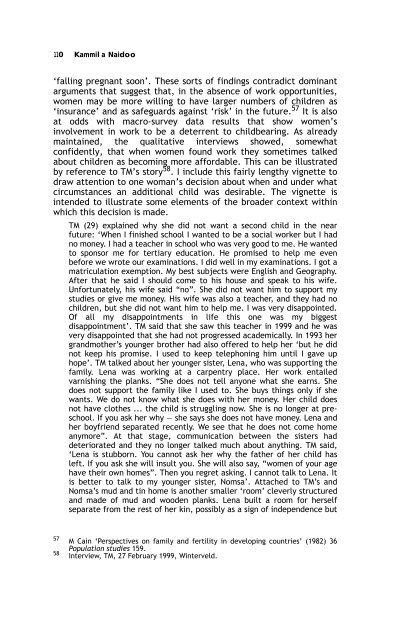Sex, Gender, Becoming - PULP
Sex, Gender, Becoming - PULP
Sex, Gender, Becoming - PULP
You also want an ePaper? Increase the reach of your titles
YUMPU automatically turns print PDFs into web optimized ePapers that Google loves.
110 Kammila Naidoo<br />
‘falling pregnant soon’. These sorts of findings contradict dominant<br />
arguments that suggest that, in the absence of work opportunities,<br />
women may be more willing to have larger numbers of children as<br />
‘insurance’ and as safeguards against ‘risk’ in the future. 57 It is also<br />
at odds with macro-survey data results that show women’s<br />
involvement in work to be a deterrent to childbearing. As already<br />
maintained, the qualitative interviews showed, somewhat<br />
confidently, that when women found work they sometimes talked<br />
about children as becoming more affordable. This can be illustrated<br />
by reference to TM’s story 58 . I include this fairly lengthy vignette to<br />
draw attention to one woman’s decision about when and under what<br />
circumstances an additional child was desirable. The vignette is<br />
intended to illustrate some elements of the broader context within<br />
which this decision is made.<br />
TM (29) explained why she did not want a second child in the near<br />
future: ‘When I finished school I wanted to be a social worker but I had<br />
no money. I had a teacher in school who was very good to me. He wanted<br />
to sponsor me for tertiary education. He promised to help me even<br />
before we wrote our examinations. I did well in my examinations. I got a<br />
matriculation exemption. My best subjects were English and Geography.<br />
After that he said I should come to his house and speak to his wife.<br />
Unfortunately, his wife said “no”. She did not want him to support my<br />
studies or give me money. His wife was also a teacher, and they had no<br />
children, but she did not want him to help me. I was very disappointed.<br />
Of all my disappointments in life this one was my biggest<br />
disappointment’. TM said that she saw this teacher in 1999 and he was<br />
very disappointed that she had not progressed academically. In 1993 her<br />
grandmother’s younger brother had also offered to help her ‘but he did<br />
not keep his promise. I used to keep telephoning him until I gave up<br />
hope’. TM talked about her younger sister, Lena, who was supporting the<br />
family. Lena was working at a carpentry place. Her work entailed<br />
varnishing the planks. “She does not tell anyone what she earns. She<br />
does not support the family like I used to. She buys things only if she<br />
wants. We do not know what she does with her money. Her child does<br />
not have clothes ... the child is struggling now. She is no longer at preschool.<br />
If you ask her why — she says she does not have money. Lena and<br />
her boyfriend separated recently. We see that he does not come home<br />
anymore”. At that stage, communication between the sisters had<br />
deteriorated and they no longer talked much about anything. TM said,<br />
‘Lena is stubborn. You cannot ask her why the father of her child has<br />
left. If you ask she will insult you. She will also say, “women of your age<br />
have their own homes”. Then you regret asking. I cannot talk to Lena. It<br />
is better to talk to my younger sister, Nomsa’. Attached to TM’s and<br />
Nomsa’s mud and tin home is another smaller ‘room’ cleverly structured<br />
and made of mud and wooden planks. Lena built a room for herself<br />
separate from the rest of her kin, possibly as a sign of independence but<br />
57 M Cain ‘Perspectives on family and fertility in developing countries’ (1982) 36<br />
58<br />
Population studies 159.<br />
Interview, TM, 27 February 1999, Winterveld.
















